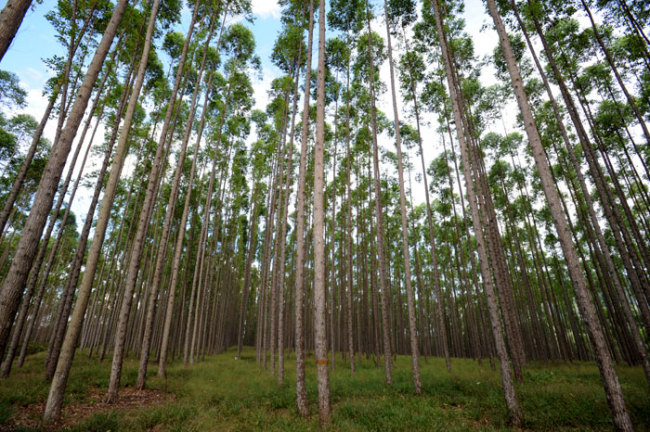The Korea Forest Service has made significant progress in developing forest resources abroad in order to secure long-term, stable lumber resources and expand carbon sinks to cope with global climate change.
The KFS’ efforts have been driven by the necessity to secure raw wood supplies from resource-rich countries, especially Indonesia, to help stabilize the economy.
The KFS’ efforts have been driven by the necessity to secure raw wood supplies from resource-rich countries, especially Indonesia, to help stabilize the economy.

Also, increasing demand for forest bioenergy, which is can replace fossil fuel and emits less greenhouse gases, drove the KFS to set bioenergy business as its new growth source through foreign forest resource development.
The governmental agency officials said Korea’s foreign forest resource development would boost the country’s status on international stages as it adapted global environmental regulations.
The foreign forest resource development plan has long-term and intermediate-term goals.
The long-term goal is to secure 1 million hectares of forest, supporting this by signing memorandums of understanding with Indonesia, Cambodia and Myanmar for afforestation investment until 2050. And the intermediate-term goal is to assure 350,000 hectares from 2015 to 2024.
However, such plans need a wide range of support from the government and private investors. According to the KFS’s policy strategy, the intermediate goal requires the government’s financial support for infrastructure, research development, and partnership reinforcement.
In the private sector, the plan needs to survey local investment climates and directly implement the forest resource development project. The KFS has expressed that it is ready to invigorate related industries and establish a certified emission reduction foundation.
In fact, the foreign afforestation progress has almost doubled since 2011, increasing from 25,456 hectares to 41,531 hectares in 2015. The afforestation area is currently highly concentrated in the Asia-Pacific region, occupying 344,247 hectares out of 399,068 hectares of forest in total.
In addition to the foreign forest resource development plan, the KFS is currently operating the region in Semarang, Indonesia, as an outpost for foreign afforestation.
“The afforestation outpost would further develop and disseminate a new business model to secure ‘wood pellets,’ which is the main (forest originated) fuel for new and renewable energy, from foreign countries,” a KFS official said.
The outpost created a 1,000-hectare wood biomass demonstrative site to test how will afforestation could provide energy. The project was cooperated by the Korea Green Promotion Agency, which is a subsidiary of the KFS, and Indonesia’s state-run forestry service.
The KFS added that the outpost would not only establish an efficient infrastructure for forest management but also operate educational training programs for a new business model development, thus inducing more private investment in foreign afforestation.
By Lee Hyoung-kwon(kwonhl@heraldcorp.com) and Shin Min-gyu (mingyu2449@heraldcorp.com)
-
Articles by Korea Herald







![[Graphic News] More Koreans say they plan long-distance trips this year](http://res.heraldm.com/phpwas/restmb_idxmake.php?idx=644&simg=/content/image/2024/04/17/20240417050828_0.gif&u=)
![[KH Explains] Hyundai's full hybrid edge to pay off amid slow transition to pure EVs](http://res.heraldm.com/phpwas/restmb_idxmake.php?idx=644&simg=/content/image/2024/04/18/20240418050645_0.jpg&u=20240419100350)






![[From the Scene] Monks, Buddhists hail return of remains of Buddhas](http://res.heraldm.com/phpwas/restmb_idxmake.php?idx=652&simg=/content/image/2024/04/19/20240419050617_0.jpg&u=20240419175937)

![[KH Explains] Hyundai's full hybrid edge to pay off amid slow transition to pure EVs](http://res.heraldm.com/phpwas/restmb_idxmake.php?idx=652&simg=/content/image/2024/04/18/20240418050645_0.jpg&u=20240419100350)

![[Today’s K-pop] Illit drops debut single remix](http://res.heraldm.com/phpwas/restmb_idxmake.php?idx=642&simg=/content/image/2024/04/19/20240419050612_0.jpg&u=)